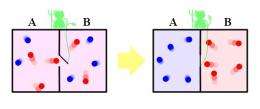June 24, 2009 feature
Could Maxwell's Demon Exist in Nanoscale Systems?

(�鶹��ԺOrg.com) -- Maxwell’s demon may be making a comeback. �鶹��Ժicists know that the demon, an imaginary creature that decreases the entropy of a system, cannot exist in macroscopic systems due to the energy it requires to perform its role. However, a recent study has shown that, on the nanoscale, Maxwell’s demon might be able to do its work with much less energy than previously thought due to tiny thermal fluctuations that occur in small systems.
In their study, physicists Raoul Dillenschneider and Eric Lutz of the University of Augsburg in Germany have proposed a model in which a nanoparticle that can exist in one of two energy states (i.e. a double-well potential) serves as an erasable one-bit memory. The particle’s memory state is zero if it’s in the left well, and one if it’s in the right well. By resetting the particle’s state to a chosen state (either one or zero, regardless of its initial state), the particle’s memory can be erased. The question that Dillenschneider and Lutz ask is exactly how much energy (in the form of heat) is required to complete the erasure process.
The same question was investigated by physicist Charles Bennett in 1982, when he showed that Maxwell’s demon, which had been puzzling scientists since 1867, cannot exist. In theory, the demon stands between two neighboring chambers of the same temperature. By opening and closing a door to allow hot particles to pass to one chamber and cold particles to the other, the demon seems to decrease the entropy of a system without performing any work, apparently violating the second law of thermodynamics.
But, as Bennett noted, the demon’s memory, which it uses to track the coordinates of each particle, must be reset to its initial state during every cycle. Erasing the demon’s memory requires energy, and increases entropy. Bennett calculated the minimum amount of heat energy required to erase one bit of information, which is known as Landauer’s bound. It turned out that the demon was generating more entropy by discarding information about the particles than it was eliminating by ushering the particles into hot and cold chambers.
One thing that Bennett’s analysis did not account for was thermal fluctuations, which are usually extremely small at large scales and easily discarded. However, these fluctuations become predominant in microscopic systems, and scientists have recently begun to recognize that the second law should be amended to account for these fluctuations.
In the current study, Dillenschneider and Lutz have accounted for the impact of tiny thermal fluctuations on memory erasure in their nanoparticle-based memory system. Through calculations and simulations, they’ve shown that the nanosystem can be erased with an amount of heat that is less than Landauer’s bound. The finding shows that the macroscopic formulation of Landauer’s principle does not hold on nanoscale systems, and should be generalized to include heat fluctuations in a way similar to the second law.
“Our research aims at describing the thermodynamic behavior of tiny (nanoscale) objects,” Lutz told �鶹��ԺOrg.com. “It is known that thermal fluctuations dominate at these length scales. However, our investigations showed that they can have observable consequences in nanomemories: information may be erased by dissipating less heat than required by Landauer's principle. Our second main contribution was to propose an experiment that may allow us to study these effects using single-particle devices. Landauer's principle, despite its fundamental importance as a link between thermodynamics and information theory, hasn't been investigated experimentally yet.”
The result also presents the possibility that Maxwell’s demon might not create as much entropy as it reduces, although the exact difference is still unknown. The scientists noted that large fluctuations are suppressed, even in nanoscale systems, in agreement with the macroscopic formulation of Landauer’s principle.
“If one defines Maxwell's demon as a creature being able to sometimes decrease the entropy of the system without performing any work, then one might conclude that Maxwell's demon is likely to exist in nanoscale systems,” Lutz said. “However, one needs to emphasize that such negative entropy fluctuations are legitimate at the nanoscale, and are generally exponentially small as described by the fluctuation theorem. The latter can be regarded as a generalization of the second law to small systems. So the existence of a nanoscale demon would not violate any physical law.”
Due to difficulties in tracking individual particles, Landauer’s principle has never been experimentally verified. But the scientists hope that recent progress in single molecule experiments could make testing possible. For example, an electrophoretic force (an electric force on particles in a fluid) could be used for controlling single particles, and a high-sensitivity CCD camera used to observe particles hopping between two wells. Lutz added that, since this research provides insight into nanoscale systems, it could have applications in other areas.
“Landauer's principle plays a fundamental role in information theory,” he said. “Our study was so far restricted to classical systems. The influence of both thermal and quantum fluctuations on memory erasure might have important consequences for quantum information processing as well (that is, erasure of qubits of information instead of classical bits).”
More information: Raoul Dillenschneider and Eric Lutz. “Memory Erasure in Small Systems.” �鶹��Ժical Review Letters, 102, 210601 (2009).
Copyright 2009 �鶹��ԺOrg.com.
All rights reserved. This material may not be published, broadcast, rewritten or redistributed in whole or part without the express written permission of �鶹��ԺOrg.com.















